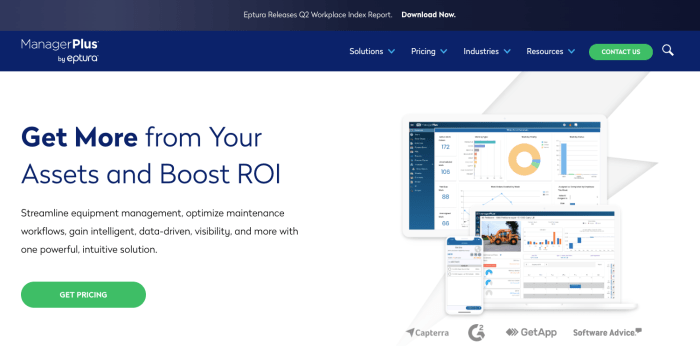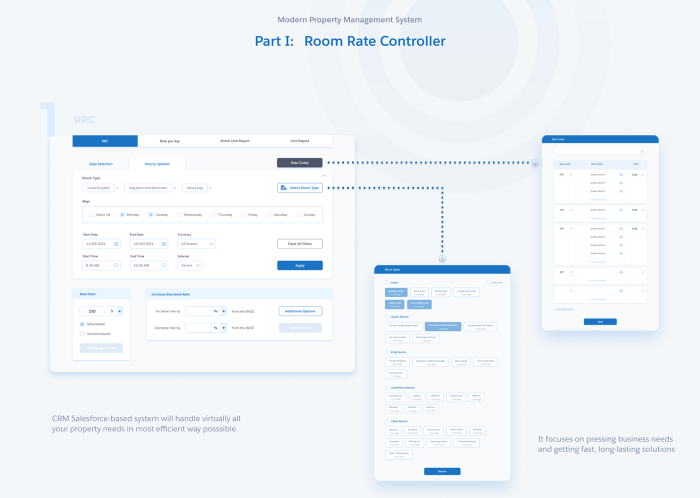Crm software for property management – The property management industry is dynamic, demanding efficiency and seamless communication to thrive. Juggling tenant interactions, maintenance requests, lease agreements, and financial records can quickly become overwhelming. This is where a robust Customer Relationship Management (CRM) system steps in, offering a centralized platform to manage all aspects of your business and significantly improve operational efficiency. This comprehensive guide explores the benefits, features, and considerations of implementing CRM software specifically designed for property management.
Understanding the Needs of Property Management CRMs
Unlike generic CRM solutions, property management CRMs are tailored to the unique demands of the industry. They go beyond simple contact management, incorporating features designed to handle property-specific data, streamline workflows, and enhance tenant satisfaction. Key requirements often include:
- Property Management: Centralized storage and management of property details, including addresses, unit layouts, amenities, and rental rates.
- Tenant Management: Comprehensive tenant profiles, lease agreement tracking, rent collection functionalities, and communication tools.
- Maintenance Management: Tracking maintenance requests, assigning tasks to contractors, managing expenses, and scheduling repairs.
- Financial Management: Integration with accounting software, rent collection tracking, expense management, and reporting capabilities.
- Communication & Collaboration: Secure communication channels for tenants, owners, and staff, fostering efficient collaboration and issue resolution.
- Reporting & Analytics: Generating insightful reports on key performance indicators (KPIs) such as occupancy rates, rent collection efficiency, and maintenance costs.
Key Features of Effective Property Management CRM Software
Tenant Management Capabilities, Crm software for property management
A strong CRM should simplify tenant interactions from the initial inquiry to lease renewal. This includes features like:
- Lead Management: Capturing and nurturing leads from various sources, including websites, online advertising, and referrals.
- Lease Management: Storing lease agreements digitally, tracking lease expiration dates, and automating renewal processes.
- Rent Collection: Facilitating online rent payments, automating reminders, and tracking payment history.
- Communication Tools: Providing secure messaging, email integration, and potentially even tenant portals for self-service.
- Tenant Screening: Integration with background check services to streamline the tenant vetting process.
Property Management Tools
Efficient property management requires a system that can handle the complexities of multiple properties. Essential features include:
- Property Database: A centralized repository for all property details, including photos, floor plans, and maintenance histories.
- Unit Management: Tracking occupancy status, rent amounts, and upcoming lease expirations for each unit.
- Inspection Management: Scheduling and documenting property inspections, with features for recording findings and generating reports.
- Vendor Management: Maintaining a database of contractors, tracking their performance, and managing invoices.
Maintenance & Repair Management
Streamlining maintenance requests and repairs is crucial for tenant satisfaction and minimizing downtime. Look for CRMs with:
- Work Order Management: Creating, assigning, and tracking work orders, from initial request to completion.
- Vendor Communication: Directly communicating with contractors through the system, simplifying scheduling and updates.
- Expense Tracking: Recording maintenance expenses, linking them to specific properties or units, and generating reports.
Financial Management & Reporting
Accurate financial tracking is essential for profitability. A property management CRM should offer:
- Rent Roll Reporting: Generating detailed reports on rent collection, outstanding balances, and occupancy rates.
- Expense Tracking: Monitoring and categorizing expenses related to property management, maintenance, and administration.
- Financial Integrations: Seamless integration with accounting software for efficient data transfer and reconciliation.
- Customizable Reports: Ability to generate custom reports based on specific needs and KPIs.
Choosing the Right Property Management CRM: Crm Software For Property Management
Selecting the right CRM involves careful consideration of your specific needs and budget. Factors to consider include:
- Number of Properties & Units: Choose a system that can scale to accommodate your current and future needs.
- Budget: CRMs range in price from affordable options to enterprise-level solutions. Evaluate the features offered against your budget.
- Integration Capabilities: Ensure the CRM integrates with your existing accounting software, marketing tools, and other essential applications.
- User-Friendliness: The system should be intuitive and easy for your team to use, minimizing training time and maximizing efficiency.
- Customer Support: Reliable customer support is crucial for resolving issues and getting the most out of your CRM.
- Scalability: Ensure the system can handle growth as your business expands.
Popular Property Management CRM Software Options
(Note: This is not an exhaustive list, and the best CRM for you will depend on your specific needs. Research and compare various options before making a decision.)

Source: website-files.com
- Buildium: A popular choice known for its comprehensive features and ease of use.
- AppFolio Property Manager: Offers a wide range of features, including marketing tools and online tenant portals.
- Rent Manager: A robust solution often preferred by larger property management companies.
- Yardi Breeze: A cloud-based solution suitable for smaller to medium-sized businesses.
Frequently Asked Questions (FAQs)
- Q: How much does property management CRM software cost? A: Pricing varies significantly depending on the features, number of users, and number of properties managed. Expect to pay anywhere from a few hundred dollars per month to several thousand dollars per month for enterprise-level solutions.
- Q: Can I integrate my CRM with other software? A: Most modern CRMs offer integration capabilities with accounting software, marketing platforms, and other business tools. Check the specific integrations offered by the CRM you are considering.
- Q: How long does it take to implement a property management CRM? A: Implementation time varies depending on the complexity of the system and the size of your business. It can range from a few weeks to several months.
- Q: What are the benefits of using a property management CRM? A: Benefits include increased efficiency, improved communication, better tenant satisfaction, streamlined workflows, and enhanced financial management.
- Q: Is cloud-based CRM better than on-premise? A: Cloud-based CRMs offer greater accessibility, scalability, and cost-effectiveness, while on-premise solutions offer more control over data security.
Conclusion
Implementing a robust CRM is a strategic investment for any property management business seeking to enhance efficiency, improve tenant relations, and drive profitability. By carefully evaluating your needs and choosing the right software, you can unlock significant operational improvements and achieve sustainable growth. Remember to thoroughly research available options, consider your budget, and prioritize user-friendliness and integration capabilities.

Source: behance.net
References
Call to Action
Ready to streamline your property management operations? Contact us today for a free consultation to discuss your specific needs and find the perfect CRM solution for your business!
Expert Answers
What are the key features to look for in property management CRM software?
Essential features include contact management, communication tools (email, SMS), task management, maintenance request tracking, lease management, reporting and analytics, and ideally, integration with other property management platforms.
How much does CRM software for property management typically cost?
Pricing varies widely depending on the features, number of users, and vendor. Expect to find options ranging from affordable monthly subscriptions to more expensive enterprise-level solutions.
What is the learning curve for using property management CRM software?
Most CRM systems offer user-friendly interfaces and training resources. The learning curve varies depending on the software’s complexity and the user’s prior experience with similar systems, but generally, it is manageable.
Can CRM software integrate with my existing accounting software?
Many CRM solutions offer integrations with popular accounting software. Check the software’s compatibility before purchasing to ensure seamless data flow between systems.
